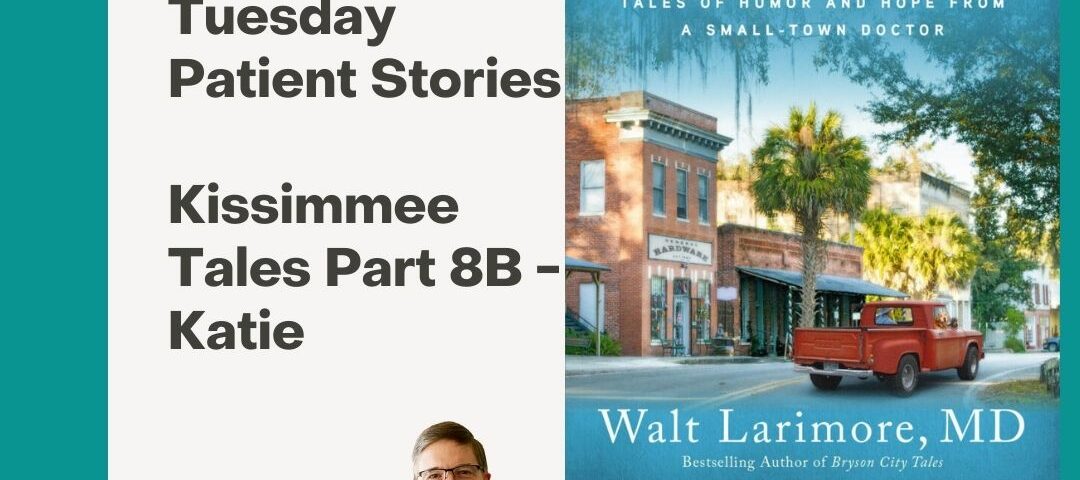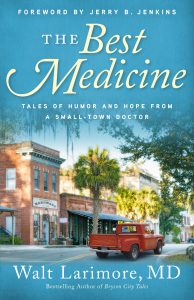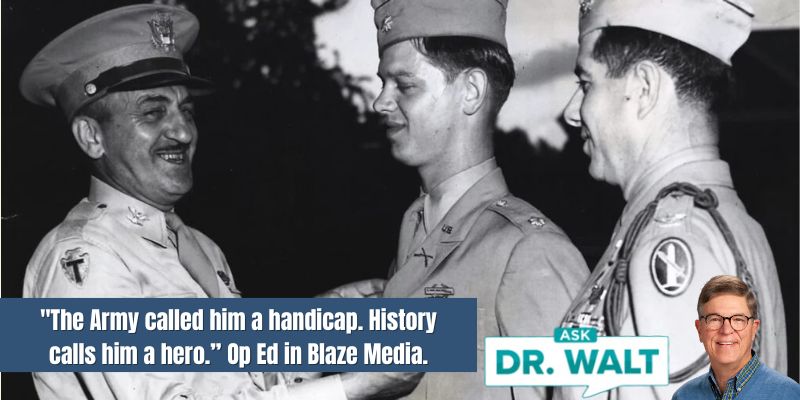
You need to know the surprising symptoms of the latest COVID variants
November 7, 2022
More weight lost with commercial program than DIY method
November 9, 2022For the next few months, I’m excerpting chapters from the first of two books about my early years in family medicine in Kissimmee, Florida – The Best Medicine: Tales of Humor and Hope from a Small-Town Doctor. I hope you, your family, and your friends will follow along and enjoy this trip back into the past with me and my family.
CHAPTER 8B – KATIE
Victor Lockwood lifted his wife, Jennifer, as she reached out with both hands.
I guided them down to her baby. “Feel the head?”
She nodded and smiled.
“Okay, give me a push, and let’s have a baby.”
She pushed. I delivered the baby’s top shoulder, and then the bottom one, and then I guided Jennifer’s hands under her baby’s arms and around the trunk.
“Okay, pull your baby up onto your abdomen.” She did as instructed. As we guided the little one from her birth canal and onto her belly, I could see the baby. It was a she as the remaining amniotic fluid cascaded into the stainless-steel bucket at my feet. I picked up a sterile blanket and covered the baby. Jennifer and Victor cooed at her and smiled at each other.
“Well come, baby girl Lockwood!” I said. Well come was my greeting for every healthy baby I delivered.
There can be so much stress during the birthing process, not only for the family but also for the birth attendants. Seeing and holding a brand-new baby—welcoming them into their lives and ours—was an eternally significant event usually accompanied by tears from the baby, the parents, and sometimes even me. It would invariably cause my heart to sing, “It is well, it is well with my soul.”[i] The hymn was penned in the 1870s by a man who had just lost four daughters, and it was my wife’s favorite, thus my greeting to every newborn: “Well come!” as my soul would worship, “It is well.”
“Katie,” Jennifer whispered. “Well come, little Katherine Jo,” she said, mimicking my greeting, as tears streaked down her cheeks.
I grabbed two clamps and attached them to the umbilical cord close to Katie’s tummy, leaving about an inch between them. I picked up surgical scissors, blade first, and handed them to Victor. He looked at the instrument and then at me as if to say, What? I nodded. “You can cut it.”
“Me?” he asked. I didn’t dare look at the nurses.
“Of course. It’s a way for you to launch her as the newest member of your family.”
He took the scissors, and as I gripped the cord, he made a perfect cut. His eyes sparkled, and a smile spread across his face that was obvious even though he wore a mask. I retrieved the scissors and put them back on the edge of the delivery table. Victor, like every other dad who did this, would attest that me letting them sever their child’s umbilical cord was one of the most unforgettable parts of the birth for them! In my over fifteen hundred deliveries during my career, I never tired of the elation.
“Are you just going to leave the baby there?” Sandi asked nervously, nodding at the waiting bassinet and warmer.
“I am,” I answered, knowing this was against their standard policy and protocol. But it was a birthing method midwives and mothers had used for millennia. However, to assuage the apparent and increasing anxiety of Sandi and the other nurses, I added, “For just a moment more, okay?”
Jennifer’s eyebrows furrowed. “I’m feeling a contraction. What do I do?”
I smiled. “It’s natural. Your body wants to expel the placenta—the afterbirth. So, Victor, why don’t you take Katie over to the warmer and help the nurses get her cleaned up and finger- and footprinted? They can even put her hand and footprints on your scrub shirt.”
As they did, I felt Jennifer’s abdomen. The contraction was beginning. “Give me one last gentle push, Jennifer.” As she did, I delivered the placenta into a sterile bowl and examined it. There were no tears or missing pieces that could have remained in the womb and caused bleeding or infection—it was healthy and intact, always a good thing.
“Let me do a quick inspection inside,” I told Jennifer. Everything was in order. No tears. No abnormal bleeding. And her uterus was contracting in what would be a several-week journey back to normal size. “Fit as a fiddle,” I declared to no one in particular.
The nurses and Victor were busy tending to little Katie, while Jennifer was watching the scene with a satisfied, almost angelic look of rapture and contentment. As a man, I was always mesmerized observing the intense emotions displayed on a woman’s face right after birth—expressions revealing her deep feelings of accomplishment, pleasure, appreciation, relief, and happiness, all bubbling out in a divinely-designed maternal ecstasy.
A smile spread across her face as tears dropped across her cheeks. That smile. I’d seen it several hundred times in medical school, residency, and Bryson City. The bliss of a mother who had just birthed her healthy baby. No more punishing contractions, paroxysms of pain, or arduous pushing. All her hopes and dreams incarnated into her infant. Her sweet expression of achievement and comfort, expectations and possibilities, wrapped into an overflowing emotion of indescribable joy. I never tired of observing this sublime and deeply spiritual moment in the formation of a young family.
I raised the bottom of the table into place and took each of her legs out of its stirrup, massaging each calf as I did so.
“That feels good,” she said, as I covered her with a warm blanket and lifted the head of the delivery table.
“We’ll get you into a comfortable bed as soon as possible.”
She smiled. “That would be nice.”
“Just rest and let me go check out Katie.”
She nodded. Katie’s exam was routine. My first delivery in Kissimmee had gone as well as could have been expected.
Yet one side of me hinted, You are lucky this went so well. My compassionate side immediately countered, No, you are skilled and blessed. For sure, I was relieved and thrilled.
TO BE CONTINUED
[i] Horatio Gates Spafford, “It Is Well with My Soul,” 1873, public domain, Wikipedia, https://en.wikipedia.org/wiki/It_Is_Well_with_My_Soul.
This excerpt from The Best Medicine: Tales of Humor and Hope from a Small-Town Doctor is provided with the permission of the publisher Baker/Revell. You can learn more about the book or purchase a copy here.
© Copyright WLL, INC. 2022.





